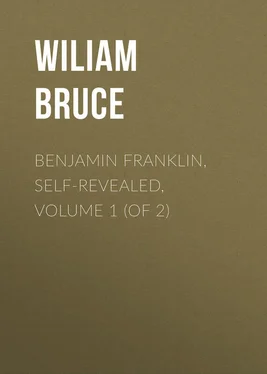Wiliam Bruce - Benjamin Franklin, Self-Revealed, Volume 1 (of 2)
Здесь есть возможность читать онлайн «Wiliam Bruce - Benjamin Franklin, Self-Revealed, Volume 1 (of 2)» — ознакомительный отрывок электронной книги совершенно бесплатно, а после прочтения отрывка купить полную версию. В некоторых случаях можно слушать аудио, скачать через торрент в формате fb2 и присутствует краткое содержание. Жанр: foreign_antique, foreign_prose, на английском языке. Описание произведения, (предисловие) а так же отзывы посетителей доступны на портале библиотеки ЛибКат.
- Название:Benjamin Franklin, Self-Revealed, Volume 1 (of 2)
- Автор:
- Жанр:
- Год:неизвестен
- ISBN:нет данных
- Рейтинг книги:5 / 5. Голосов: 1
-
Избранное:Добавить в избранное
- Отзывы:
-
Ваша оценка:
- 100
- 1
- 2
- 3
- 4
- 5
Benjamin Franklin, Self-Revealed, Volume 1 (of 2): краткое содержание, описание и аннотация
Предлагаем к чтению аннотацию, описание, краткое содержание или предисловие (зависит от того, что написал сам автор книги «Benjamin Franklin, Self-Revealed, Volume 1 (of 2)»). Если вы не нашли необходимую информацию о книге — напишите в комментариях, мы постараемся отыскать её.
Benjamin Franklin, Self-Revealed, Volume 1 (of 2) — читать онлайн ознакомительный отрывок
Ниже представлен текст книги, разбитый по страницам. Система сохранения места последней прочитанной страницы, позволяет с удобством читать онлайн бесплатно книгу «Benjamin Franklin, Self-Revealed, Volume 1 (of 2)», без необходимости каждый раз заново искать на чём Вы остановились. Поставьте закладку, и сможете в любой момент перейти на страницу, на которой закончили чтение.
Интервал:
Закладка:
"Let modest Foster, if he will excel
Ten metropolitans in preaching well."
The Synod found against him, but so agreeable to Franklin was the all too-brief taste that he had enjoyed of good works that he adhered to Hemphill to the last. "I stuck by him, however," he says, "as I rather approv'd his giving us good sermons compos'd by others, than bad ones of his own manufacture, tho' the latter was the practice of our common teachers"; among whom he doubtless included the dreary shepherd who had made so little out of the verse in the fourth chapter of Philippians. Everything found its practical level in that mind at last. It might be added that Franklin's stand on this occasion was but in keeping with a final word of counsel which he wrote many years afterwards to his daughter Sally, when he was descending the Delaware on his way to England. After enjoining upon her especial attention her Book of Common Prayer, he continued: "Yet I do not mean you should despise sermons, even of the preachers you dislike, for the discourse is often much better than the man, as sweet and clear waters come through very dirty earth."
After the Hemphill disappointment, he ceased to attend the church in which his protégé had come to grief, though he continued to subscribe to the support of its minister for many years. He took a pew in an Episcopal Church, Christ Church, and here he was careful that his family should regularly worship every Sunday, notwithstanding the fact that he was too busy again with his studies on that day to worship there himself, or placed too much confidence in his Art of Virtue and Articles of Belief and Acts of Religion to feel the need for doing so. Here too his daughter and his son Francis who died in childhood were baptized, and here his wife and himself were buried. While he rarely attended the services at this church, he was one of its mainstays in every pecuniary sense.
In more than one particular, Franklin was lax in France where he was only liberal in America. At any rate he was even less of a Sabbatarian in the former country than he was in the latter. As respects observance of the Sabbath, he fully fell in with French usages and was in the habit of setting apart the day as a day for attending the play or opera, entertaining his friends, or amusing himself with chess or cards. One of Poor Richard's maxim's was: "Work as if you were to live a hundred years, pray as if you were to die to-morrow," and, while Franklin was not the person to pray in just that rapt fashion, he seems to have thought rather better of prayer than of other religious ceremonies. In the letter of caution to his daughter Sally, from which we have already quoted, he tells her, "Go constantly to church, whoever preaches. The act of devotion in the Common Prayer Book is your principal business there, and if properly attended to, will do more towards amending the heart than sermons generally can do. For they were composed by men of much greater piety and wisdom, than our common composers of sermons can pretend to be." He promptly repelled an intimation of his sister Jane that he was opposed to divine worship with the statement that, so far from thinking that God was not to be worshipped, he had composed and written a whole book of devotions for his own use; meaning his Articles of Belief and Acts of Religion . This statement always brings back to us the reply of Charles Sumner, when he was very sick, and was asked whether he was prepared to die, viz. that he had read the Old Testament in the Greek version. A glance at the "First Principles," with which the book begins, would hardly, we fear, have allayed the fears of Jane. That Franklin should ever, even at the age of twenty-two, have composed anything in the way of a creed so fanciful, not to say fantastic, is nothing short of an enormity, even more startlingly out of harmony with his usually sound and sure-footed intelligence than the whimsical letter to General Charles Lee, in which, on the eve of the American Revolution, he advised a return to bows and arrows as efficient instruments of modern warfare. "I believe," commences the creed, "there is one supreme, most perfect Being, Author and Father of the Gods themselves. For I believe that Man is not the most perfect Being but one, rather that as there are many Degrees of Beings his Inferiors, so there are many Degrees of Beings superior to him." Then, after quite a lengthy preamble, follows this Confession of Faith:
Therefore I think it seems required of me, and my Duty as a Man, to pay Divine Regards to SOMETHING.
I conceive then, that The INFINITE has created many beings or Gods, vastly superior to Man, who can better conceive his Perfections than we, and return him a more rational and glorious Praise.
As, among Men, the Praise of the Ignorant or of Children, is not regarded by the ingenious Painter or Architect, who is rather honour'd and pleas'd with the approbation of Wise Men & Artists.
It may be that these created Gods are immortal; or it may be that after many Ages, they are changed, and others Supply their Places.
Howbeit, I conceive that each of these is exceeding wise and good, and very powerful; and that Each has made for himself one glorious Sun, attended with a beautiful and admirable System of Planets.
It is that particular Wise and Good God, who is the author and owner of our System, that I propose for the object of my praise and adoration.
Under the same head of "First Principles," there is a slight flavor of the Art of Virtue: "Since without Virtue Man can have no Happiness in this World, I firmly believe he delights to see me Virtuous, because he is pleased when he sees Me Happy."
That one of the sanest, wisest, and most terrene of great men, and a man, too, who was not supposed in his time to have any very firm belief in the existence of even one God, should, young as he was, have peopled the stellar spaces with such a hierarchy, half pantheistic, half feudal as this, is, we take it, one of the most surprising phenomena in the history of the human intellect. James Parton surmises that the idea probably filtered to Franklin, when he was a youth in London, through Dr. Pemberton, the editor of the third edition of the Principia , from a conjecture thrown out in conversation by Sir Isaac Newton. It reappears in Franklin's Arabian Tale . "Men in general," says Belubel, the Strong, "do not know, but thou knowest, that in ascending from an elephant to the infinitely Great, Good, and Wise, there is also a long gradation of beings, who possess powers and faculties of which thou canst yet have no conception."
The next head in the book of devotions is "Adoration," under which is arranged a series of liturgical statements, accompanied by a recurrent note of praise, and preceded by an invocation and the following prelude in the nature of a stage direction:
Being mindful that before I address the Deity, my soul ought to be calm and serene, free from Passion and Perturbation, or otherwise elevated with Rational Joy and Pleasure, I ought to use a Countenance that expresses a filial Respect, mixed with a kind of Smiling, that Signifies inward Joy, and Satisfaction, and Admiration. 8 8 We are informed by Franklin in the Autobiography that he inserted on one page of his "little book" a "scheme of employment for the twenty-four hours of a natural day." The opening injunction of this plan of conduct brings the wash-basin and the altar into rather amusing juxtaposition: "Rise, wash, and address Powerful Goodness !"
The liturgical statements are followed by another direction that it will not be improper now to read part of some such book as Ray's Wisdom of God in the Creation , or Blackmore on the Creation , or the Archbishop of Cambray's Demonstration of the Being of a God , etc., or else to spend some minutes in a serious silence contemplating on those subjects. Then follows another direction calling for Milton's glorious Hymn to the Creator ; then still another calling for the reading of some book, or part of a book, discoursing on, and inciting to, Moral Virtue; then a succession of resonant supplications, adjuring the aid of the particular Wise and Good God, who is the author and owner (or subfeudatory) of our System, in Franklin's efforts to shun certain vices and infirmities, and to practice certain virtues; all of the vices, infirmities and virtues being set forth in the most specific terms with the limpidity which marked everything that Franklin ever wrote, sacred or profane. One of the supplications was that he might be loyal to his Prince and faithful to his country. This he was until it became impossible for him to be loyal to both. Another was that he might avoid lasciviousness. The prayer was not answered; for William Franklin, on account of whose birth he should have received twenty-one lashes under the laws of Pennsylvania, was born about two years after it was framed. Creed and liturgy end with a series of thanks for the benefits which the author had already received. Both creed and liturgy, we are told by James Parton, were recorded with the utmost care and elegance in a little pocket prayer-book, and the liturgy Franklin practiced for many years. For a large part of his life, he bore his book of devotions and his book of moral practice about on his person wherever he went, as if they were amulets to ward off every evil inclination upon his part to yield to what he calls in the Autobiography "the unremitting attraction of ancient habits."
Читать дальшеИнтервал:
Закладка:
Похожие книги на «Benjamin Franklin, Self-Revealed, Volume 1 (of 2)»
Представляем Вашему вниманию похожие книги на «Benjamin Franklin, Self-Revealed, Volume 1 (of 2)» списком для выбора. Мы отобрали схожую по названию и смыслу литературу в надежде предоставить читателям больше вариантов отыскать новые, интересные, ещё непрочитанные произведения.
Обсуждение, отзывы о книге «Benjamin Franklin, Self-Revealed, Volume 1 (of 2)» и просто собственные мнения читателей. Оставьте ваши комментарии, напишите, что Вы думаете о произведении, его смысле или главных героях. Укажите что конкретно понравилось, а что нет, и почему Вы так считаете.










![Benjamin Franklin - Memoirs of Benjamin Franklin; Written by Himself. [Vol. 2 of 2]](/books/747975/benjamin-franklin-memoirs-of-benjamin-franklin-wr-thumb.webp)
![Benjamin Franklin - Memoirs of Benjamin Franklin; Written by Himself. [Vol. 1 of 2]](/books/748053/benjamin-franklin-memoirs-of-benjamin-franklin-wr-thumb.webp)
